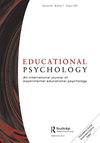新冠肺炎对大学一年级学生幸福感的影响
IF 3
2区 心理学
Q1 EDUCATION & EDUCATIONAL RESEARCH
引用次数: 1
摘要
摘要过去的研究发现,大学生的幸福感相对较低,一年级学生特别容易受到伤害。这一问题在新冠肺炎大流行期间引起了特别关注。本研究考察了新冠肺炎对大学一年级学生的幸福感、学业自信、知情感和自我效能的影响。使用了横截面和纵向数据。调查数据来自比利时一所大学一年级的两组学生(N = 997):新冠病毒前的队列(N = 493)和受新冠病毒影响的队列(N = 504)。在两个测量时刻为新冠病毒前队列收集数据,在四个测量时刻收集受新冠病毒影响的队列的数据。首先,受试者间分析(ANCOVA)显示新冠肺炎对学生的幸福感没有显著影响(p > .100),学术自信(p > .100)和知情感(p > .100),抵达大学时。然而,三周后,受新冠病毒影响的队列报告的幸福感(略)低于新冠病毒前的队列(p=.057,η2=.01)。其次,对受新冠肺炎影响的队列的纵向分析(重复测量ANCOVA)揭示了整个学年幸福感的变化(p < .001,ηp2 = .39)和自我效能感(p < .001,ηp2 = .04)。幸福感和自我效能感在第一学期下降(p < .001),在第二学期开始时略有恢复(p < .001)。讨论了在学生向高等教育过渡期间如何支持他们的教育意义。本文章由计算机程序翻译,如有差异,请以英文原文为准。
The effect of COVID-19 on the well-being of first-year university students
Abstract Past studies have found that university students’ well-being is relatively low, and that first-year students are specifically vulnerable. This issue has drawn particular attention during the COVID-19 pandemic. This study examines the effect of COVID-19 on the well-being, academic confidence, feeling of informedness, and self-efficacy of first-year university students. Both cross-sectional and longitudinal data were used. Survey data were collected from two cohorts of first-year students at a Belgian university (N = 997): a pre-covid cohort (N = 493) and a covid-affected cohort (N = 504). Data were gathered at two measurement moments for the pre-covid cohort and at four measurement moments for the covid-affected cohort. First, between-subject analyses (ANCOVA) revealed no significant effect of COVID-19 on students’ well-being (p > .100), academic confidence (p > .100), and feeling of informedness (p > .100), on arrival at university. Three weeks later, however, the covid-affected cohort reported (marginally) lower well-being than the pre-covid cohort (p = .057, η2 = .01). Second, longitudinal analyses (repeated measures ANCOVA) on the covid-affected cohort revealed changes throughout the academic year in well-being (p < .001, ηp 2 = .39) and self-efficacy (p < .001, ηp 2 = .04). Well-being and self-efficacy decreased during the first semester (p < .001), and slightly recovered at the start of the second semester (p < .001). Educational implications on how to support students during their transition to higher education are discussed.
求助全文
通过发布文献求助,成功后即可免费获取论文全文。
去求助
来源期刊

Educational Psychology
Multiple-
CiteScore
6.40
自引率
6.20%
发文量
57
期刊介绍:
This journal provides an international forum for the discussion and rapid dissemination of research findings in psychology relevant to education. The journal places particular emphasis on the publishing of papers reporting applied research based on experimental and behavioural studies. Reviews of relevant areas of literature also appear from time to time. The aim of the journal is to be a primary source for articles dealing with the psychological aspects of education ranging from pre-school to tertiary provision and the education of children with special needs. The prompt publication of high-quality articles is the journal"s first priority. All contributions are submitted "blind" to at least two independent referees before acceptance for publication.
 求助内容:
求助内容: 应助结果提醒方式:
应助结果提醒方式:


